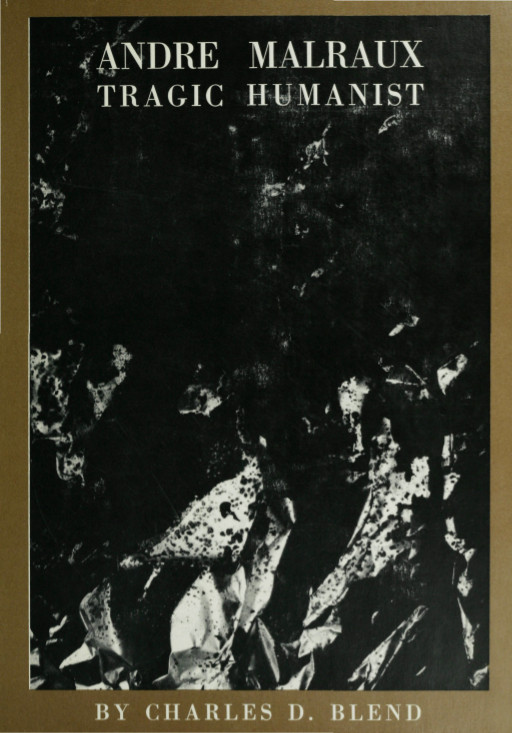Charles D. Blend: André Malraux: Tragic Humanist (1963)
Filed under book | Tags: · art, biography, communism, humanism, poetry, politics

“The dominant question arising from the unparalleled inhumanity of the mid-twentieth century, André Malraux has suggested “Is man dead?” Yet, for him, to pose the question is to answer it, for man proves his greatness, not by affirming it, but by questioning. It is by a mise en question of the universe that man rises above it.
This interpretation, long central to Malraux’s thinking, brings with it a number of difficulties. Previous concepts of man have produced an image, an ideal, toward which man could orient himself, and have presupposed a culture that had a role in the scheme of things. With a vision of man based on questioning rather than affirmation, it becomes impossible to preconceive an image of him or to visualize a form for human culture, and traditional humanism passes from the picture.
For Malraux, however, man has something that is greater than a preconceived image of himself: consciousness or awareness. To replace the images of man that have been destroyed or invalidated, Malraux calls for the will to grasp the greatest possible consciousness of what it is to be a man, coupled with the will to absolutely free discovery. Combining these values, Malraux suggests, produces a culture that is a human adventure, an advehture in freedom. Humanism is still possible, but it is a tragic humanism—humanism, because man knows his will and his starting point; tragic, because he can never know where he is going. Man can lead a dignified and fruitful existence given the will to struggle endlessly with the unknown.”
Publisher Ohio State University Press, 1963
255 pages
Harold Aram Veeser: Edward Said: The Charisma of Criticism (2010)
Filed under book | Tags: · biography, criticism, history, literary theory, middle east, politics

This insightful critical biography shows us an Edward Said we did not know. H. Aram Veeser brings forth not the Said of tabloid culture, or Said the remote philosopher, but the actual man, embedded in the politics of the Middle East but soaked in the values of the West and struggling to advance the best European ideas. Veeser shows the organic ties connecting his life, politics, and criticism.
Drawing on what he learned over 35 years as Said’s student and skeptical admirer, Veeser uses never-before-published interviews, debate transcripts, and photographs to discover a Said who had few inhibitions and loathed conventional routine. He stood for originality, loved unique ideas, wore marvelous clothes, and fought with molten fury. For twenty years he embraced and rejected, at the same time, not only the West, but also literary theory and the PLO. At last, his disgust with business-as-usual politics and criticism marooned him on the sidelines of both.
The candid tale of Said’s rise from elite academic precincts to the world stage transforms not only our understanding of Said—the man and the myth—but also our perception of how intellectuals can make their way in the world.
Publisher Routledge, 2010
ISBN 0415902649, 9780415902649
260 pages
review (Kim Peterson, Dissident Voice)
Comment (0)John Edward Fletcher: A Study of the Life and Works of Athanasius Kircher, ‘Germanus Incredibilis’: With a Selection of his Unpublished Correspondence and an Annotated Translation of his Autobiography (2011)
Filed under book | Tags: · 1600s, biography, history, history of science, science

Athanasius Kircher, a German Jesuit in 17th-century Rome, was an enigma. Intensely pious and a prolific author, he was also a polymath fascinated with everything from Egyptian hieroglyphs to the tiny creatures in his microscope.
His correspondence with popes, princes and priests was a window into the restless energy of the period. It showed first-hand the seventeenth-century’s struggle for knowledge in astronomy, microscopy, geology, chemistry, musicology, Egyptology, horology.. The list goes on.
Kircher’s books reflect the mind-set of 17th-century scholars – endless curiosity and a substantial larding of naiveté: Kircher scorned alchemy as the wishful thinking of charlatans, yet believed in dragons.
His life and correspondence provide a key to the transition from the Middle Ages to a new scientific age. This book, though unpublished, has been long quoted and referred to. Awaited by scholars and specialists of Kircher, it is finally available with this edition.
Edited for publication by Elizabeth Fletcher
Editorial adjustment for the Aries Book Series by Garry Trompf
Publisher Brill, Leiden/Boston, 2011
Volume 12 of Aries Book Series
ISBN 9004207120, 9789004207127
656 pages

